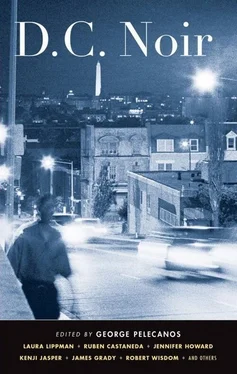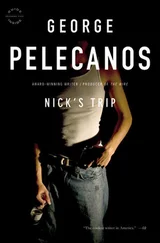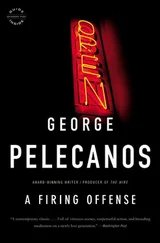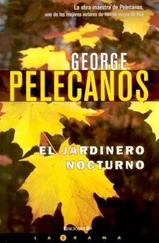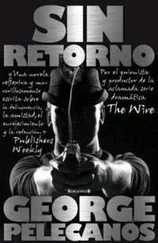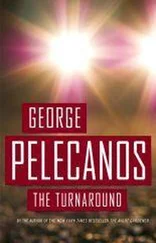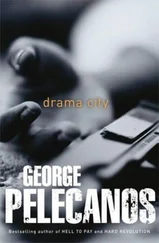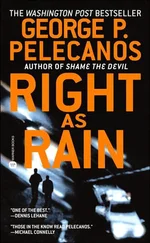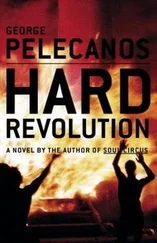The two corporals and the major came back around the side of the building as if they had been to the latrine or were returning from a smoke break. They ordered everybody back inside. Liebmann filed into the dormitory and lay down on the pine slat that passed for his bed. He realized that he did not know the tattoo artist’s name, and now the man and his name were lost with all the others, disappeared. Liebmann repeated his own name to himself, over and over, Jacob Liebmann, Jacob Liebmann , suddenly convinced that doing so might stand as some sort of protection, an incantation prayed to all the names of the lost gone silent in a thousand forsak nights, in the trackless abandoned last winter of the war.
Liebmann walked the streets of Shepherd Park. It was after midnight, in the week between Christmas and New Year. A gentle snow had fallen earlier in the day, leaving a half-inch dusting on the rooftops and cars and in the trees.
When Liebmann could not sleep he often gave up on the effort, got up and dressed and went out to walk the silent world. The cover of snow left the night even quieter, and he turned south outside his building, crossed Georgia Avenue and followed several blocks down to Fern, turned right to track the fenceline of the grounds of Walter Reed, the sprawling army hospital. Turned into the residential area on 13th Street and saw the snowfall had spangled shrubbery and porch railings and fences. The houses were mostly dark, a lamp here or there in a living room or behind an upstairs bedroom curtain. As he rounded up toward the corner where Alaska Avenue met Georgia, he saw lights moving inside his tore
He approached the intersection of Georgia and Alaska Avenues and Kalmia Road, and then stopped directly across from the front windows of his store. Lights flicked and darted somewhere inside. Liebmann was at first confused, then he understood — flashlights. In the quiet out on the street, even at his distance, he heard glass shattering, as if somebody was breaking one bottle with another. And laughter.
Someone inside smashing bottles and laughing.
Later, Liebmann would not remember any thought or specific plan as he cut around the rear of his store to edge in close to the wall. The glass plate in the back door was punched out. He crouched and eased through the opening, taking care to avoid the shards around the edges of the frame. He stood and saw three figures in a furious pleasure, flinging pints and fifths of whisky and vodka and gin against the wall, wailing and hooting when a bottle hit and exploded. One of them swung something sideways into the shelves, scattering bottles that popped like firecrackers as they hit the floor and burst.
A fierce alcohol reek, overheated, sick and pungent, the fouled sweetness everywhere.
The three carried on, oblivious to Liebmann, who moved into his office and found a key on the ledge over the door and unlocked the lower left desk drawer. He took out the little pistol, pushed the safety off, and stepped back out into the store. He held the gun straight up over his head at arm’s length and squeezed the trigger.
The sound inside his store was nothing like the flat snap a Luger made in the open, frosted air of Germany — this was contained thunder, the sudden combustion of something unbridled and wild.
The three figures startled and crouched and froze where they were, faces ratcheted toward him. Liebmann stepped forward, crunching broken glass, felt the floor wet and precarious.
Two of them bolted, slipping and flailing as if they were on ice, making their way for the door. One of them fell, sliding on the floor, riding the glass, yelping in pain.
Liebmann ignored them to come within ten feet of the kid with the crewcut. The kid was wearing the motorcycle jacket. A baseball bat dangled in his right hand.
“You just couldn’t do it,” Liebmann said. “Mind your own business. Leave me alone.”
The kid stared a moment, the same slack-jawed insolence as when Liebmann kicked him out of the store, when the bus driver tossed him off the bus. Then he said, “I’m outta here, man.” He started to move.
Liebmann lifted the pistol into view, holding it up beside his face, pointed at the ceiling. “Not so fast. I thought maybe we have a little talk.”
The pistol gave the kid pause but he worked quickly back into his moody swagger. “So, what, you gonna shoot me? For this? We was just havin a little fun.”
“It was you who painted the words, yes?”
“What words?”
Liebmann lifted the pistol and fired into a wall. The kid hunched backward, cried out, dropped the bat, and lifted his hands as if to shield himself.
“The words,” Liebmann said, after the echo of the gun blast subsided. “Red paint. The front window.”
The kid straightened, let his hands move back to his sides. “So what if I did?” He started to work his way across the glass.
Liebmann pointed the pistol directly at the kid, tracking him as he moved. The kid kept a few yards between himself and Liebmann and said, “You can’t do nothin crazy here, man. We was just screwin around.”
Liebmann shifted the pistol to the right of the kid and fired again, this time into the wall. He moved the barrel a degree and fired again. A case of Coca-Cola hissed, spitting and fizzing and boiling over. Moved the barrel and fired again. The kid was howling now, hands over his face, knees going soft.
Liebmann fired into a flank of Alsatian whites, Rieslings, and Gewurztraminers. The rack of bottles ignited and blew apart in glittering spray, silvered glass and golden wines showering into the aisle.
The echo and reverberation of the gun was everything now, throbbing against the walls and ceiling, otherworldly, pure and untrammeled and wanton. The sound had severed something in Liebmann.
The kid was sobbing and sagged to his knees on the floor. “Crazy motherfucker,” he said, heaving, all his imagined power drained away. “You’re gonna kill me, right?”
A car passed outside, headlights searchlighting the room, the extent of the damage visible for several seconds. The floor gleamed with spilled and flooding booze and the jeweled light of shattered glass.
Liebmann looked back to the kid, held his gaze a long moment. Finally he said, “You do not deserve to die. You are not worthy of such an honor.” His voice shook when he spoke. He was breathless, tainted in some way that was just coming to him. He lowered the pistol to his side.
“You’re stone crazy, ain’t you?” the kid said. “Crazy Jew.”
Liebmann gazed at the boy for another moment, and then said, “Go. Get out.”
The kid lurched to his feet, slipping, working for purchase on the wet floor.
Liebmann turned and crunched across the glass back to the cubicle office at the front of the store. He opened the desk drawer and returned the gun to its place. The kid made his way toward the door, slipped once and went down on one knee and grimaced as he caught himself with the heel of his hand. There was a blood smear on the floor when he lifted his hand away, black in the half-light.
Liebmann was no longer watching. He sat at the desk, his back to the room. “Get out,” he said, speaking toward the wall. “I never want to see you again. Nowhere. Ever. Never in this life.”
The kid paused near the office. “You just did all that to make me piss myself. Well, I did. Hope you’re satisfied.”
Liebmann did not answer.
The kid said, “Crazy fuck.”
Leibmann sat long after the kid was gone and the night’s silence regained. An occasional car hissed along the wet street outside. He sat in the dark and looked at the wall and marveled that no police had come, no fire truck, not a curious neighbor, nobody seemed to have heard a thing. Shepherd Park is not the neighborhood it once was, he thought. The idea brought no feeling one way or another. In the morning he would call the police and the insurance company to file the reports and pretend that he happened on the devastation when he opened the store in the morning. Just another morning coming to work, only this time to a bad surprise. He would describe his distress at what he discovered. Because what could anybody do? Besides, he could never explain. Or say why it happened, even if it was possible to carry it that far. Or why he had not called the police when he saw the lights in the store and heard the sounds of the damage being done. Now, looking at the wall, exhausted, vaguely ill, Liebmann knew he could not explain his shame to strangers. There had been a problem, and it was his, and he had taken care of it — he would leave it at that, in his own mind. He was not about to relate the way he had gone down under the heel of time, how a simple animal rage had blossomed against the ways his life was taken from him.
Читать дальше
